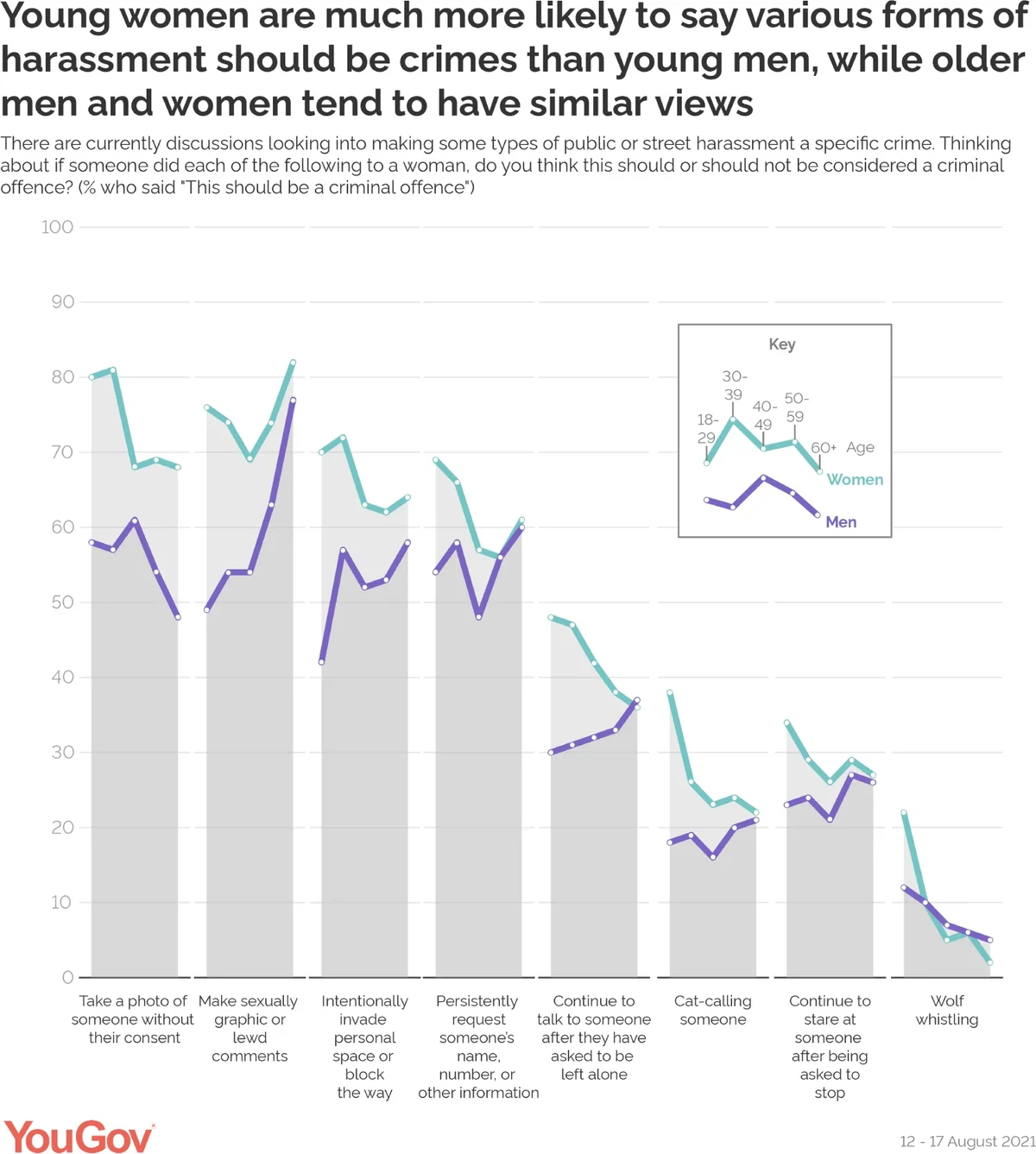The vast majority of women have experienced both types of harassment
Earlier this summer, home secretary Priti Patel announced that the government would be taking action to protect women from street harassment such as wolf-whistling and cat-calling. This will include a review of the existing law, and the possibility of making sexual harassment a new criminal offence to plug gaps in current legislation.
New YouGov research shows that opinion on which types of harassment should constitute a criminal offence varies greatly. The public are most likely to think that making sexually graphic or lewd comments should be an offence, at 69%. Another 64% say taking photos of people without consent should also be an offence, and 60% think blocking someone’s way or invading their personal space should be as well. A similar proportion think continued requests for someone’s name or information should also be criminalised (59%).
However, people are less sure of other types of harassment, with 37% thinking that continuing to talk to someone after being asked to stop is worthy of criminalisation versus 44% who say it is not.
Only 23% think that cat-calling should be criminalised, and for wolf-whistling less than one in ten (8%) say the same. This is compared to 50% and 78% respectively who think these actions should not be offences.
Women are almost universally more likely to be in favour of criminalising forms of sexual harassment. At the top end of the scale, this includes 76% of women who think making sexually graphic or lewd comments should be criminalised versus 62% of men. Another 72% want taking photos of people without consent to be an offence, compared to just over half of men (55%) – a 17pt gap. Some 66% of women think intentionally invading personal space is worthy of being criminalised as well, compared to 53% of men.
This sentiment is most pronounced among young women, who in nearly all cases tend to be more in favour of criminalising acts of harassment than both older women and men of all ages. Differences between the genders tend to diminish with age, however, with older men and women being of similar minds when it comes to most of these forms of harassment.

This trend is perhaps most apparent when people are asked about wolf-whistling. Some 22% of women aged 18 to 29 think it should be criminalised, compared to 12% of men the same age. Only 2% of women and 5% of men aged 60+ say the same.
This narrowing gap between genders as people age can also be seen on someone making sexually graphic or lewd comments. Three-quarters of women aged between 18 and 29 (76%) say doing so should be a criminal offence, compared to 49% of men the same age – a 27 percentage point gap. Among those aged 60 and over 82% of women and 77% of men say making sexually graphic or lewd comments should be an offence, a difference of only 5 points.
For most of the types of harassment YouGov asked about, the difference between men and women 60 and over is not significant. The biggest exception comes over people taking photos without consent, where there is a 20-point gap between women (68%) and men (48%) of this age.
How often have Britons been subject to sexual harassment?
Women aged 18-29 are much more likely to have been the target of unwanted sexualised comments, gestures or acts (69%) than their male peers (31%). Women 60 and over are less likely to say they have experienced unwanted sexualised comments (44%) than younger women.
The vast majority of women overall (73%) have experienced being wolf-whistled at, and another 43% say they have been cat-called at least once, Women between 18 and 29 are both the most likely to have experienced cat-calling (66%)
Despite the majority not experiencing it first hand, some 57% of men say they wouldn’t think it unacceptable – this includes 25% who would find it not only acceptable but flattering.
See full results here







